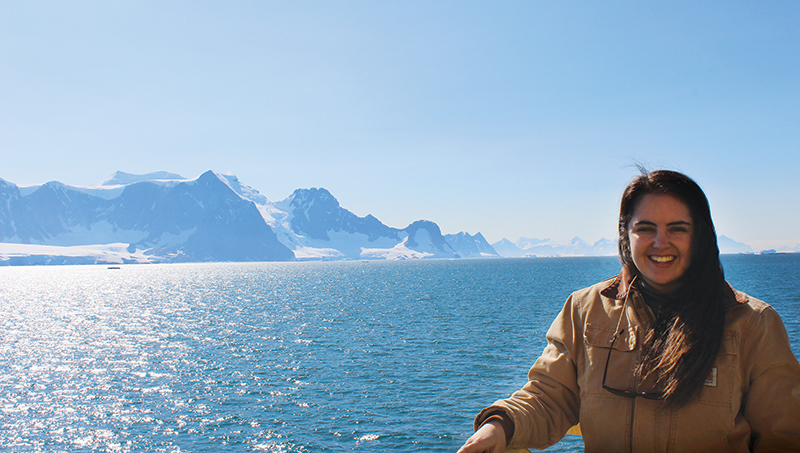The Oceanographer
Fall
2020
Spotlight on Hidden Physicists
The Oceanographer
Jackie Veatch, PhD Student in Physical Oceanography, Department of Marine and Coastal Science, Rutgers University
Scrolling through a seemingly endless dropdown menu of potential majors on a college application, I came across “biophysics.” Having never seen this word before, I thought to myself, “That sounds awesome,” and just rolled with it. Flash forward a year and I’m in my first semester of college at The George Washington University, exploring properties of light, the mechanics of a frog leg, and everything in between. Simply put: I was hooked.
I had always enjoyed math and science and, in high school, found that I might even be good at it. As I began college, I was enthralled by the idea of using physics to study complex biological systems. I tried my hand at immunology research, exploring the microscopic biophysics behind infectious disease. After a few years, I knew that it was time for something new. I was determined to combine my love for the outdoors with my interest in physics and, more urgently, to get out of the mouse room. I began working in Dr. Keryn Gedan’s coastal ecology lab and quickly discovered that my interests coupled the physical and biological mechanisms of Earth systems. At the time, I had never heard of someone using a background in physics to study the environment. And Dr. Gedan’s lab had never had a physics student before. Nevertheless, I was convinced that physics was everywhere, even in the marshy coastline of the Chesapeake Bay.
As my graduation approached, I was a little overwhelmed by all of the different ways I could use my physics degree. I was inspired by scientific discovery but knew that the more traditional applications of biophysics that undergraduate professors studied weren’t for me. I began researching schools that took interdisciplinary approaches to making sense of Earth systems. It turns out that a lot of scientists use physics to tackle complex environmental problems. And there is a lot of physics in the ocean! I accepted a position at Rutgers University, where I’m currently pursuing a PhD in oceanography.
My research examines the physical mechanisms of the marine food web, focusing on Palmer Deep, Antarctica. In my current position I’m able to use physics to study the biological world, with applications to a cause that I’m very passionate about—the environment.
I really enjoy the distribution of my work. Between observed data and simulated experiments, field work and office time, I get a good mix of experiences. The biggest highlight of my graduate studies thus far has definitely been my field research trip to Palmer Deep. Researching in Antarctica felt like being deployed to the front line of climate change. Seeing firsthand the effects of a warming climate, such as a retreating glacier or shifting plankton ecology, makes global warming feel a lot closer than it ever has and gives my research a sense of urgency.
I’m thankful for my strong background in physics, which has given me a sense of academic fearlessness and, in my opinion, an advantage when tackling intricate oceanic problems.
I encourage the next generation of physics students to look for physics in unconventional places. Your scientific breadth need not be bound by traditional definitions of what a physicist looks like!

